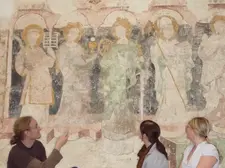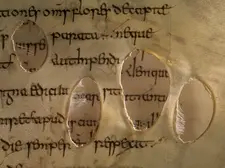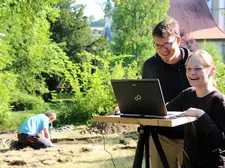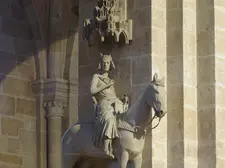Programme Profile




Key to understanding – thematic clusters
Self-selected focus areas are an essential component of your studies. From each thematic cluster, you can select one discipline that you wish to study as a subdiscipline of Medieval Studies. In one focus area, you will strengthen your specialisation with additional modules and your master’s thesis.
The in-depth study of several disciplines allows you to gain a multi-perspective insight into various fields within the humanities. This also enables you to explore modern issues from various perspectives and approach them with different methods.
Thematic cluster I: Linguistic structures and literary representations
English Studies; German Language, Literature and Culture; Iranian Studies; Greek and Latin Studies; Romance Studies; Slavic Studies
Thematic cluster II: Historical sources and theoretical texts
Medieval History, Auxiliary Sciences of History, Philosophy, Catholic Theology
Thematic cluster III: Material culture and visual representations
Medieval and Post-Medieval Archaeology, Heritage Conservation Studies, Islamic Art and Archaeology, Art History
Read more about the participating disciplines.
Practice-oriented studies with close links to current research
In addition to your focus areas, you will attend seminars created specifically for this programme that illuminate a topic from different angles and subject perspectives and help hone your interdisciplinary thinking skills. Through internships and field trips, you’ll get a first-hand view of medieval artefacts, medieval research and professions in the field of cultural studies, and you will also learn about how the Middle Ages are taught.
Visit lectures given by specialists in current research, including those from outside the university who we invite to participate in our subject-specific or especially interdisciplinary advanced seminars. Our close cooperation with the Centre for Medieval Studies’ (ZEMAS) research network also allows you to gain insights into medieval research as a student and to earn credit towards your degree by participating in conferences or congresses. You can also present your final thesis to the experienced members of the Centre for Medieval Studies (ZEMAS).
In addition, you can acquire skills that consolidate the knowledge and working methods you have learnt in the focus areas. Learn additional foreign languages, strengthen your IT skills or develop your competencies in other disciplines within the humanities.
Read more about the qualification goals of the master’s programme in Medieval Studies.
Type of studies
The master’sdegree programme in Medieval Studies can be studied full or part time. You may enrol in a degree programme part-time without justifying your decision. You may also switch from a full-time model to a part-time model during any semester’s enrolment period. Please find further information on studying part-time on the university’s central pages.